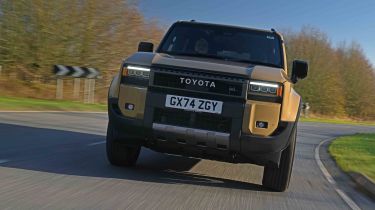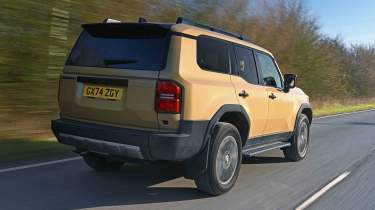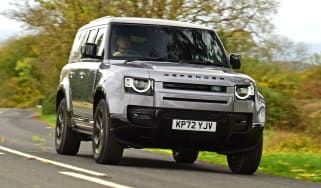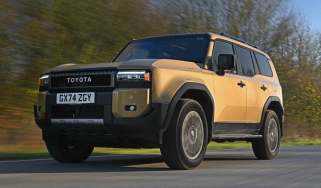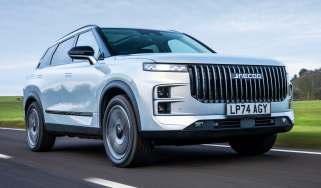Toyota Land Cruiser review - Engines, drive & performance
“The Land Cruiser is brilliant off-road, but even on-road it’s more refined than before”
In the UK, at least, Toyota has taken a very traditional approach with the Land Cruiser’s engine. It gets a 2.8-litre diesel only, which may seem unusual in a car market turning away from the fuel, but the Toyota Land Cruiser is a no-nonsense off-roader, and the grunt offered by this type of engine makes it a logical pairing. Work has gone into making it a little more refined than its application in the Toyota Hilux pickup truck, and the aforementioned mild-hybrid version is also expected by 2025, with the brand claiming this model will offer even better response and quietness.
Unsurprisingly, the Toyota Land Cruiser’s forte is off-road driving, where its permanent all-wheel drive system and sophisticated tech really comes into its own. In fact, when we tested it in the Scottish Highlands we found it offered incredible traction on our muddy test route, even in waterlogged chasms and across steep drops and rises. There was very little jerky kickback from the electronic power steering when going over difficult terrain, which makes it easy to handle.
The Land Cruiser comes with sophisticated terrain response tech which adjusts the gearbox, engine mapping, steering and brakes in response to different surface conditions. There’s also a locking differential and anti-roll bars which can be decoupled for off-road driving, but when we drove the Land Cruiser, none of these extra aids were needed – it’s good to know that it’s been overengineered for whatever’s thrown at it, though.
Is the Toyota Land Cruiser good to drive in town?
We were impressed with how well the Land Cruiser performed on tighter roads, meaning it’s much more capable in the city than you might expect. It’s no city car, of course, but there’s great visibility and a tight turning circle means it’s more manoeuvrable than its dimensions might indicate. At low speeds around town, though, many of the road’s imperfections do get transmitted through the cabin and with no adaptive dampers offered on UK models like there will be overseas, it can’t quite match the Land Rover Defender’s air suspension for comfort.
Is the Toyota Land Cruiser good to drive on long journeys?
The Toyota Land Cruiser performed well on the motorway when we tested it. There was a low degree of road and wind noise which was impressive given the Land Cruiser’s upright, flat windscreen.
Is the Toyota Land Cruiser good to drive on B-roads?
While we wouldn’t suggest the Toyota Land Cruiser is the best choice of car if weaving through windy B-roads is your main priority, it’s remarkable how much of a difference the Sport mode makes to this large 4x4’s demeanour on this sort of road. The engine mapping gets more aggressive in this setting, and the transmission is more responsive, while the Land Cruiser’s brakes do a great job of slowing the car down, despite its heft.
Diesel models
There’s no petrol version of the Toyota Land Cruiser, with just the one 2.8-litre turbocharged four-cylinder diesel. This produces 202bhp, so it’s quite a bit less powerful than the six-cylinder diesel offered in the Land Rover Defender, but it feels impressively responsive even at low revs, with the eight-speed automatic transmission doing a good job of changing gears at the right time.
Toyota’s attempts at improving the engine’s refinement have been very successful, and although there’s some distant rattle at lower speeds, this dies down at cruising speeds where it feels settled and steady.
| Model | Power | 0-62mph | Top speed |
| 2.8-litre turbocharged four-cylinder diesel engine | 202bhp | 10.9 seconds | 102mph |
